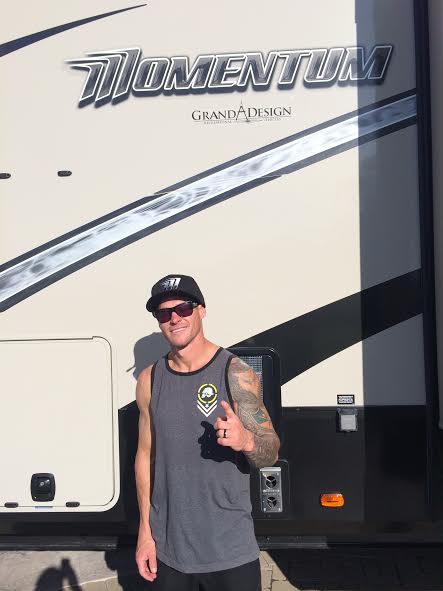I saw this on Greg Gerbers site today, RV Daily Report, and I thought it was something interesting for Toyhauler people to know about.
AUBURN, Calif. — The California Travel Industry Association (CalTIA) is backing proposed legislation that would force the state to ban the use of six chemicals that the association said have proven to be capable of damaging various types of septic systems while posing significant threats to groundwater supplies.
However, the bill is being met by opposition within the RV industry by companies which believe the regulation is unnecessary and not based on science. In fact, one opponent suggests that the bill, if passed as written, would make many RVers criminals by simply driving an RV across the California border.
“A good deodorant is essential to having a pleasant camping experience,” said Kevin Phillips, vice president of sales and marketing for Thetford Corporation. “Without a good deodorant, RVs and campgrounds would be more than a little smelly, especially in high-temperature settings.”
The legislation, AB 1824, would ban the use of holding tank products containing bronopol, dowicil, formaldehyde, glutaraldehyde, paraformaldehyde and para-dichlorobenzene.
The bill, which has already cleared the Assembly Committee on Environmental Safety and Toxic Materials as well as the Assembly Appropriations Committee, could go to the full floor of the Assembly floor as early as next week.
Legislation ignores the bigger problem
But, the problem is not going to be solved by banning deodorants from toilet tank chemicals, Kevin Phillips, vice president of sales and marketing for Thetford Corporation, told RV Daily Report.
“There are many regulations on the books today regulating septic systems. Those regulations, for example, determine how big the septic system must be based on the size of the campground,” said Phillips. “Over the years, campgrounds have been cited because their septic systems were not working. The problem is generally not due to any additives being pumped into their system. It has more to do with the septic system’s a capacity for handling a large volume of highly concentrated waste.
“The laws already on the books say that materials in used toilet chemicals must be biodegradable,” he explained. “That means the deodorant products must breakdown naturally. If the deodorants are already breaking down, then how can they be contributing to septic tank problems?”
But, the California Travel Industry Association disagrees. They feel the chemicals being added to control odor in RV septic systems are interfering with the natural decomposition of waste.
“Toxic chemicals, like those used in many common RV toilet additives, kill the natural bio-organisms and cause the septic systems to fail, causing sewage to seep into surrounding soil and groundwater,” CalTIA Legislative Advocate Teresa Cooke wrote in a letter to Felipe Fuentes, chairman of the Assembly Appropriations Committee.
“AB 1824 will help keep the state’s groundwater clean, and benefit hundreds of small businesses throughout the state, potentially saving them tens of thousands of dollars that would otherwise be spent on repairing or replacing their parks’ septic systems,” said Cooke.
Nineteen chemicals are already banned in state regulations.
“AB 1824 will simply clarify that six additional chemicals cannot be used in RV toilet additives for the same reasons as the 19 currently banned,” Cooke said.
Where’s the data?
Phillips said that if legislators would actually visit a campground to see how the systems are used, they would come up with an entirely different bill.
“People proposing this new law don’t cite a scientific study that backs their claims that the chemicals are detrimental to the septic tank,” said Phillips. “The summary of the bill before the legislature uses broad terms like ‘can be’ or ‘may be’ or ‘known to be.’ That means they don’t have the science to back up those claims.”
But, Thetford knows all about science. Mary Burrows, Thetford’s manager of chemical development, is a trained scientist who spends much of her day testing and analyzing chemicals in Thetford products to ensure they comply with state laws. She is regarded as the RV industry’s expert on chemicals for cleaning RVs and helping to treat waste.
In reviewing the proposed legislation in California, Burrows asks, “Where is the data?”
“Studies show that if a septic system is sized and operated properly, then the ingredients contained in these deodorants are being treated,” she told RV Daily Report. “But the key is that the system must be sized and operated properly — and that includes pumping out tanks regularly.
“A rational, scientific evaluation of the problems faced by campground owners today point to multiple other causes,” she wrote in a letter to Pedro Nava, chairman of the Assembly Environmental Safety and Toxic Materials Committee.
Setting scientific standards
Following a law passed in California in 1979, companies like Thetford have relied on performance-based standards to define what is and is not biodegradable. In fact, the regulatory standards adopted to ensure compliance with that statute mandates that substances contained in toilet chemicals require a minimum of 50 percent biodegradation.
One of the chemicals that would be banned in the California law is formaldehyde, which is tested to be between 92 and 99.7 percent biodegradable, said Burrows, with most studies showing it exceeds the 99 percent threshold.
“This lack of scientific based criteria would compromise the performance of products with consumers, and places the legislature in the position of making scientific judgments that are inconsistent with the Green Chemistry initiative,” said Burrows.
“Rather than outright prohibiting specified chemicals from the use in chemical toilets, we believe that a performance-based standard on a specific chemical’s biodegradable characteristics is more scientifically justified,” she added.
The bill would ban the very chemicals that makes odor control possible at high temperatures, said Phillips. For example, the bill would also ban the use of bronopol, the chemical commonly used in porta johns typically used at public events.
Phillips said he can understand why campgrounds don’t want to spend $10,000 to update their septic systems, but he also doesn’t want to see them advocate banning deodorants that are not the root cause of the problem.
“We need to dig a bit more because there are probably ways to help campgrounds maintain their septic systems,” he explained. “Rather than using a broad brush to whitewash the real problem, we should work together to find the right solution.”
Highly concentrated waste
Studies done on RV holding tanks show that waste in those tanks is up to 15 times more concentrated that common household waste. “RVers use little water when flushing. Then the material is held in the tank for several days before it is emptied all at once,” said Burrows.
“Generally, everyone empties their tanks on Sunday night or Monday. Consequently, that shocks the campground’s septic system because it isn’t sized or designed to handle a large load of concentrated material,” she added. “Once overloaded, any septic system will fail to function in the intended manner.
“I assure you, campgrounds will have the same problem whether or not deodorizing chemicals are present in the waste being dumped at their parks,” said Burrows. “It is unfair to single out biodegradable chemicals found in toilet additives as the primary cause of septic problems when there are, in fact, multiple causes.”
The legislation, as currently written, will raise several other issues as well. First, banning chemicals to control orders will result in RVers placing other serious chemicals into their holding tanks to suppress the odor.
“For example, an RV owner might pour bleach or Pine-Sol cleaner into a holding tank to reduce the smell,” said Burrows. “This consumer behavior would likely undermine the purpose of Assembly Bill 1824 by further complicating the chemistry of septic tanks and wastewater treatment systems.”
The other issue focuses on the consequences of the bill’s language which would make it illegal to “use” the prohibited chemicals. So, RVers coming to California from other states would be in violation of the law if they simply have any of the banned products in their RVs — whether or not they dump their tanks in the state, said Phillips.
“If I live in Oregon and drive to California in my RV to spend the day, the law would allow me to be cited simply for having the deodorants in my RV’s storage tanks,” he explained. “What if I add deodorants in Colorado when I start my trip, and don’t dump the tanks until I return home? This law will make lawbreakers out of many RVers who visit California.
“RVers are good stewards of the environment and want to do the right things,” he added. “If the California legislature simply passes on problems to consumers by saying they can’t use certain products or chemicals without the science to back it up, then they are simply postponing a real solution as problems continue to resurface.”



